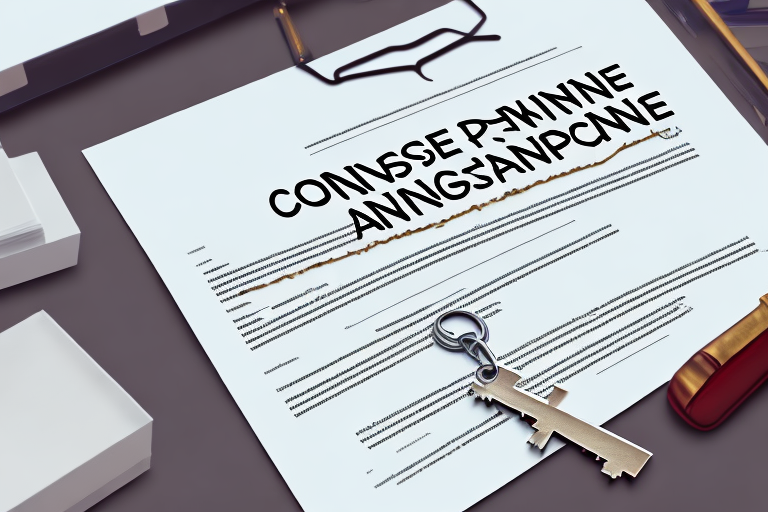The Role of Conveyancing in Real Estate Transactions
Buying or selling a property is a huge decision that can affect a person’s finances and livelihood for years to come. As a result, it’s important to have a clear understanding of the conveyancing process and the role it plays in real estate transactions.
Understanding Conveyancing Newcastle
Conveyancing is the process of transferring ownership of a property from one person or entity to another. It typically involves a conveyancer or solicitor who acts on behalf of the buyer or seller to ensure that all legal requirements have been met and the transaction is completed successfully.
Definition of Conveyancing
At its core, conveyancing Newcastle involves the legal and administrative work that is necessary to transfer ownership of a property. This includes tasks such as searches of the property title and local authority records, preparing and reviewing contracts, and ensuring that all necessary documentation is in order.
The Importance of Conveyancing in Real Estate
One of the most fundamental aspects of conveyancing Newcastle is that it provides a level of legal protection for both the buyer and the seller. By having a qualified professional handle the legal and administrative aspects of the transaction, both parties can be assured that all legal requirements have been met and that the transfer of ownership will be completed smoothly.
Conveyancing is a critical part of the real estate industry. It ensures that the transfer of ownership is conducted in a legally binding manner, and that all parties involved are protected. The conveyancer or solicitor will work to identify any issues that may arise during the transaction, such as outstanding debts or disputes over the property. They will also ensure that the buyer is aware of any restrictions or covenants that may affect the property, such as planning restrictions or rights of way.
Another important aspect of conveyancing Newcastle is the preparation and review of contracts. These contracts outline the terms of the sale, including the purchase price, any conditions of the sale, and the date of completion. The conveyancer or solicitor will ensure that the contract is fair and legally binding, and that all parties understand the terms of the agreement.

Conveyancing can also involve a range of other tasks, such as arranging for the transfer of funds and registering the new ownership with the relevant authorities. It is a complex process that requires a high level of expertise and attention to detail.
Overall, conveyancing is an essential part of the real estate industry. It provides peace of mind for both buyers and sellers, and ensures that the transfer of ownership is conducted in a legally binding manner. If you are buying or selling a property, it is important to seek the advice of a qualified conveyancer or solicitor to ensure that the transaction is completed successfully.
The Conveyancing Newcastle Process
The conveyancing Newcastle process is an essential part of buying or selling a property. It involves a series of legal procedures that ensure the transfer of ownership is done correctly and efficiently. The process can be broken down into three main stages:
Pre-Contract Stage
The pre-contract stage is the first step in the conveyancing Newcastle process. This is where the conveyancer will conduct searches and prepare the necessary documentation. The searches will include checking the property’s title, local authority searches, and environmental searches. These searches will help to identify any potential issues that may affect the property’s value or the buyer’s ability to use it as intended.
The conveyancer will also prepare a contract of sale and review any special conditions associated with the sale. The contract will outline the terms of the sale, including the purchase price, deposit amount, and completion date. The conveyancer will ensure that the contract is legally binding and that both parties understand their obligations.
Exchange of Contracts
Once the contract has been prepared, it will be exchanged between the buyer and the seller. At this point, both parties are legally bound to complete the transaction. The buyer will usually pay a deposit, which is held in an escrow account until completion. The deposit is usually 10% of the purchase price, but this can vary depending on the agreement between the buyer and the seller.
During the exchange of contracts, the conveyancer will also arrange for the transfer of any mortgage funds. This will involve liaising with the buyer’s lender to ensure that the funds are available on the completion date.
Post-Exchange and Completion
The post-exchange and completion stage is the final step in the conveyancing process. During this stage, the conveyancer will handle the paperwork and financial transactions associated with transferring ownership of the property. The completion date is usually set for a few weeks after the exchange of contracts, allowing time for both parties to prepare for the move.
The conveyancer will deposit the balance of the purchase price into the seller’s account and arrange for the transfer of the property title. They will also pay any outstanding fees, such as stamp duty and land registry fees. Once all the paperwork has been completed, the buyer will receive the keys to the property, and the transaction will be complete.
In conclusion, the conveyancing process is a vital part of buying or selling a property. It ensures that the transfer of ownership is done correctly and efficiently, protecting both the buyer and the seller. By understanding the process and working with an experienced conveyancer, you can ensure that your property transaction runs smoothly.
Key Players in Conveyancing
The conveyancing process involves a number of different players, each with their own unique role to play in the transaction. Understanding the roles of these key players is important for anyone looking to buy or sell a property.

Conveyancers and Solicitors
Conveyancers and solicitors are professionals who specialize in real estate law and conveyancing. They are responsible for ensuring that the transaction meets all legal requirements and is completed successfully. This involves a range of tasks, such as conducting property searches, drafting contracts, and transferring funds.
It is important to choose a conveyancer or solicitor who is experienced and knowledgeable in the field, as they will be able to provide valuable advice and guidance throughout the process. They can also help to identify any potential issues or complications that may arise, and work to resolve them before they become major problems.
Buyers and Sellers
Buyers and sellers are the two main parties involved in the transaction. The buyer is typically responsible for arranging financing, while the seller is responsible for providing documentation related to the property title and any other relevant information.
For buyers, it is important to have a clear understanding of their budget and what they are looking for in a property. This can help to narrow down the search and ensure that they find a property that meets their needs and fits within their budget.
For sellers, it is important to have all documentation related to the property in order, including the title, any relevant permits, and information about any past renovations or repairs. This can help to streamline the process and ensure that the transaction goes smoothly.
Mortgage Lenders and Surveyors
Mortgage lenders and surveyors play an important role in the conveyancing process by ensuring that the property is worth the asking price and that it is a safe investment for the buyer. This involves carrying out a survey of the property and evaluating its condition.
For buyers, it is important to shop around for the best mortgage deal, taking into account factors such as interest rates, repayment terms, and any associated fees. It is also important to have a clear understanding of the maximum amount that can be borrowed, and to ensure that the monthly repayments are affordable.
For surveyors, it is important to carry out a thorough inspection of the property, looking for any potential issues or defects that could affect the value or safety of the property. This can include checking for damp, subsidence, and other structural issues, as well as evaluating the condition of the roof, windows, and other key features.
Overall, the conveyancing process can be complex and time-consuming, but with the right team of professionals in place, it can be completed successfully and with minimal stress. By understanding the roles of the key players involved, buyers and sellers can ensure that they are well-prepared for the process and can make informed decisions at every step along the way.
Types of Conveyancing
Conveyancing is a legal process that involves transferring the ownership of a property from one person to another. It is a complex process that requires a lot of attention to detail and expertise. There are two main types of conveyancing: residential and commercial.

Residential Conveyancing
Residential conveyancing is a process that involves the transfer of ownership of homes, apartments, and other residential properties. This process is important because it ensures that the buyer of the property has legal ownership. Residential conveyancing involves a lot of paperwork and legal procedures that must be completed before the transfer of ownership can take place.
During the residential conveyancing Newcastle process, the conveyancer will conduct various searches to ensure that the property is free from any legal issues such as outstanding mortgages, liens, or other encumbrances. They will also check that the property has the necessary planning permissions, building regulations, and other certificates.
The conveyancer will also prepare the necessary legal documents such as the contract of sale and transfer of ownership. They will ensure that all parties involved in the transaction have signed the necessary documents and that the necessary payments have been made.
Commercial Conveyancing
Commercial conveyancing is a process that involves the transfer of ownership of commercial properties such as office buildings, warehouses, and retail spaces. The process is similar to residential conveyancing Newcastle but can be more complex due to the nature of commercial properties.
During commercial conveyancing, the conveyancer will conduct various searches to ensure that the property is suitable for the intended use. They will also check that the property has the necessary planning permissions, building regulations, and other certificates.
The conveyancer will also prepare the necessary legal documents such as the contract of sale and transfer of ownership. They will ensure that all parties involved in the transaction have signed the necessary documents and that the necessary payments have been made. In addition, they will also ensure that any necessary licenses or permits are in place for the new owner to operate their business in the property.
Commercial conveyancing can be a complex process that requires a lot of expertise and attention to detail. It is important to work with a conveyancer who has experience in dealing with commercial properties to ensure that the process goes smoothly.
Common Conveyancing Issues and Solutions
Despite the care and attention that goes into the conveyancing Newcastle process, issues can still arise. Some of the most common issues include:
Property Title Issues
Issues related to the property title can cause delays and complications in the conveyancing Newcastle process. This can include disputes over boundary lines, liens on the property, and other legal issues.
Boundary Disputes
Boundary disputes can occur when there is uncertainty about where one property begins and another ends. This can be resolved through a survey of the property and negotiation between the parties involved.
Environmental Concerns
Environmental concerns such as contamination or the presence of hazardous materials can impact the value of a property and require additional due diligence and legal documentation.
Despite these challenges, the role of conveyancing remains critical to the success of real estate transactions. By working with experienced professionals and adhering to best practices, buyers and sellers can minimize risk and ensure a successful transaction.




